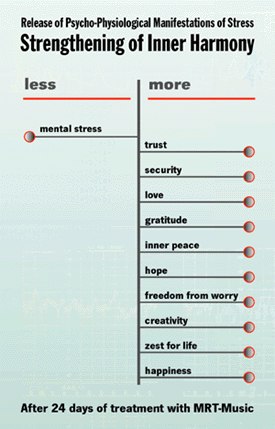The therapy program was composed of 4 therapeutic blocks of 6 days each. In these 6 days the patients were treated with 19 different compositions of Medical Resonance Therapy Music® in a specific sequence.
Three treatments per day were given individually in the room (morning, noon, and evening) and two treatments per day in the group (before lunch and afternoon) Therapy time per day was 4-5 hours. The whole program of 4 blocks was taken by 3 ms-patients (Mr A, 41 years old, development of ms in attacks with partly remissions; Mrs B, 52 years old, slow chronically progressing form of ms; Mrs C, 36 years old, development of ms in attacks with partly remissions).
14 other patients took part for 2 therapy blocks only. Even if their data were not evaluated in detail for this study their general development was along the same lines.
characterized by two different aspects
- intensive and effective reappraisal of previously undigested experiences – as a release of past mental stress situations
- unusually deep experience of harmonious values such as trust, security, love, gratitude, inner peace, hope, confidence, freedom from worry, creativity, zest for life and happiness
Investigators:
Dr. med. Mihr
